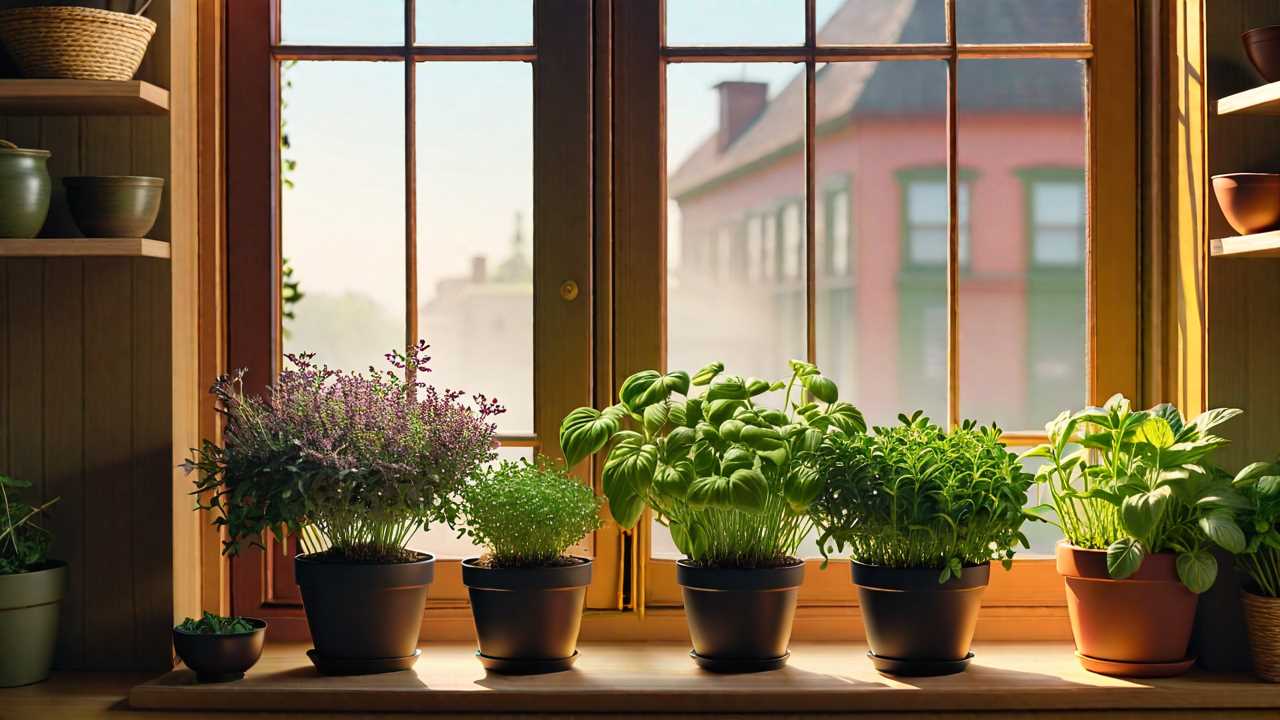
If you've ever found yourself craving a touch of greenery in your indoor space, you might be pleasantly surprised by the joys of growing herbs indoors. Imagine the convenience of having fresh herbs at your fingertips year-round, enhancing your culinary creations and even contributing to your well-being. But with so many options available, how do you know which herbs are the best suited for indoor growth? Let's delve into a few key contenders that could transform your indoor garden into a flourishing oasis of flavor and fragrance.
Easy-to-Grow Herbs for Beginners
If you're new to growing herbs indoors, starting with resilient plants like basil and mint can boost your confidence and yield satisfying results. Basil is a versatile herb that thrives in well-draining soil and enjoys plenty of sunlight. It's important to keep the soil consistently moist but not waterlogged to prevent root rot. Pinching off the top leaves encourages bushier growth, providing you with more leaves to harvest.
Mint, on the other hand, is a hardy herb that tolerates a variety of conditions. It's best to plant mint in a separate container due to its invasive nature. Keep the soil consistently moist and place the container in a spot with partial sunlight. Regularly pinching off the top leaves promotes new growth and prevents the plant from becoming leggy.
Both basil and mint are perfect for beginners due to their forgiving nature and the joy they bring to your culinary creations.
Fragrant Herbs for Aromatherapy
Discover the world of fragrant herbs for aromatherapy by incorporating scented plants like lavender and rosemary into your indoor herb garden. Aromatherapy can help create a calming atmosphere, improve focus, and relieve stress.
Here are a few fragrant herbs that are perfect for aromatherapy:
- Lavender: Known for its calming properties, lavender can help reduce anxiety and promote relaxation. It's perfect for creating a peaceful environment in your home.
- Rosemary: This herb has a refreshing scent that can help improve concentration and memory. It's great for boosting productivity during work or study sessions.
- Peppermint: With its invigorating aroma, peppermint can help alleviate headaches and boost energy levels. It's ideal for creating a revitalizing atmosphere.
- Lemon Balm: Known for its citrusy fragrance, lemon balm can help uplift your mood and reduce stress. It's perfect for creating a cheerful ambiance in your living space.
Culinary Herbs for Cooking Enthusiasts
Consider incorporating a variety of culinary herbs into your indoor garden to improve your cooking skills and enrich the flavors of your dishes. Herbs like basil, parsley, chives, and cilantro are essential for adding freshness and depth to your culinary creations. Basil, with its sweet and slightly peppery flavor, is perfect for Italian dishes, while parsley's bright and grassy taste complements a wide range of recipes.
Chives, with their mild onion flavor, are great for garnishing and adding a subtle kick to dishes. Cilantro, known for its distinctive taste, is fantastic in Mexican and Asian cuisines.
Rosemary and thyme are robust herbs that can withstand indoor growing conditions and are versatile in various dishes. Rosemary's pine-like aroma pairs excellently with roasted meats and vegetables, while thyme's earthy flavor enhances soups, stews, and marinades.
Medicinal Herbs for Health Benefits
Including medicinal herbs in your indoor garden can provide a natural way to boost your health and well-being. These herbs not only add greenery to your space but also offer numerous health benefits.
Here are four medicinal herbs that are easy to grow indoors and can be beneficial for your health:
- Peppermint: Known for its calming properties, peppermint can help with digestion issues like bloating and indigestion. It also has antibacterial properties that can support oral health.
- Lavender: With its soothing aroma, lavender is great for reducing stress and promoting relaxation. It can also aid in improving sleep quality.
- Echinacea: Echinacea is commonly used to boost the immune system and fight off colds and infections. It can be a valuable herb to have on hand during flu season.
- Aloe Vera: This versatile plant is excellent for treating minor burns, cuts, and skin irritations. Aloe vera also has moisturizing properties that can benefit your skin.
Frequently Asked Questions
Can Herbs Be Grown in a Bathroom With Little Sunlight?
In a bathroom with little sunlight, opt for herbs that thrive in low light conditions like mint, parsley, or chives. Consider using a grow light to supplement light needs. Maintain proper drainage and ventilation to prevent mold growth.
Do Herbs Attract Pests When Grown Indoors?
When growing herbs indoors, pests can be attracted if not careful. To prevent this, regularly inspect plants, maintain proper airflow, and avoid overwatering. Implementing natural remedies like neem oil or beneficial insects can help mitigate pest issues.
How Often Should Indoor Herbs Be Fertilized?
To keep indoor herbs healthy, fertilize them every 4-6 weeks during the growing season. Use a balanced liquid fertilizer at half strength. Check soil moisture before fertilizing and avoid overfeeding, which can harm the plants.
Can Herbs Be Grown Hydroponically Indoors?
Thinking about hydroponic herbs indoors? Absolutely! You can grow herbs hydroponically inside your home. It's a practical and efficient way to cultivate fresh herbs year-round, providing a steady supply for your culinary adventures.
What Herbs Are Safe for Pets in Indoor Gardens?
When planning an indoor garden safe for pets, consider herbs like basil, mint, and thyme. These herbs are pet-friendly and can thrive indoors. Remember to research each plant's toxicity levels and make sure your beloved companions stay safe.
 SportsHollywoodLifestyleFashionHome & GardenTrendsPrivacy PolicyTerms And Conditions
SportsHollywoodLifestyleFashionHome & GardenTrendsPrivacy PolicyTerms And Conditions
